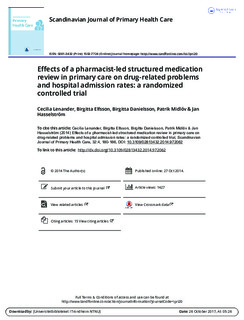Effects of a pharmacist-led structured medication review in primary care on drug-related problems and hospital admission rates: a randomized controlled trial
Journal article

Åpne
Permanent lenke
http://hdl.handle.net/11250/2445150Utgivelsesdato
2014Metadata
Vis full innførselSamlinger
Originalversjon
Lenander, C., Elfsson, B., Danielsson, B., Midlöv, P. & Hasselström, J. (2014) Effects of a pharmacist-led structured medication review in primary care on drug-related problems and hospital admission rates: a randomized controlled trial. Scandinavian Journal of Primary Health Care, 32(4), s. 180-186. 10.3109/02813432.2014.972062Sammendrag
Objective . To determine whether a pharmacist-led medications review in primary care reduces the number of drugs and the number of drug-related problems. Design. Prospective randomized controlled trial. Setting. Liljeholmen Primary Care Centre, Stockholm, Sweden. Subjects . 209 patients aged 65 years with fi ve or more different medications. Intervention . Patients answered a questionnaire regarding medications. The pharmacist reviewed all medications (prescription, nonprescription, and herbal) regarding recommendations and renal impairment, giving advice to patients and GPs. Each patient met the pharmacist before seeing their GP. Control patients received their usual care. Main outcome measures. Drug-related problems and number of drugs. Secondary outcomes included health care utilization and self-rated health during 12 months of follow-up. Results. No signifi cant difference was seen when comparing change in drug-related problems between the groups. However , a signifi cant decrease in drug-related problems was observed in the intervention group (from 1.73 per patient at baseline to 1.31 at follow-up, p 0.05). The change in number of drugs was more pronounced in the intervention group (p 0.046). Intervention group patients were not admitted to hospital on fewer occasions or for fewer days, and there was no signifi cant difference between the two groups regarding utilization of primary care during follow-up. Self-rated health remained unchanged in the intervention group, whereas a drop (p 0.02) was reported in the control group. This resulted in a signifi cant difference in change in self-rated health between the groups (p 0.047). Conclusions. The addition of a skilled pharmacist to the primary care team may contribute to reductions in numbers of drugs and maintenance of self-rated health in elderly patients with polypharmacy.
Beskrivelse
Randomisert kontrollert studie hvor det undersøkes om en farmasøytledet legemiddelgjennomgang i primærhelsetjenesten reduserer antall legemidler og antallet legemiddelrelaterte problemer.
